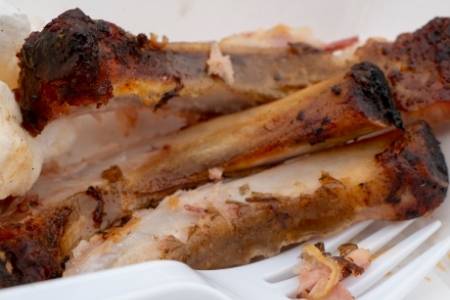
Now should is interesting. A cut leg bone for example is more likely to splinter.

Some small dog owners give porterhouse bones to their pets.
Is it bad for dogs to eat rib bones. This includes poultry bones and pork bones. Rib bones especially pork rib bones are high in fat. Dogs arent built to handle this amount of saturated fat and can suffer from pancreatitis.
No dogs shouldnt eat rib bones because eating rib bones usually means eating cooked bones which are very dangerous for your dog as they could splinter and hurt their insides or cause a blockage that might compromise their health. Rib bones are long and often split or splinter and can become shards that the dog eats and causes problems when entering the winding path of the intestines. BIG beef bones are better than small more brittle pork bones.
This can also happen with chicken or other poultry bones turkey pheasant quail and such and as such should never be given to your dog. A dog that eats cooked rib bones can be in danger of damaging its intestines and throat. Moreover it can also lead to intestinal blockage and choking.
Cooking causes the rib bone to dry out and become brittle. While it may be easier to bite for dogs it can crack and obtain sharp edges. Of course you can the question becomes should.
Now should is interesting. I have raised seven labs all of whom as any one knows who has had labs are quite capable of eating throwing up and eating their own just produced vomit. However avoid giving your dog those big hollow beef bones filled with lots of marrow eg shank cuts or any of a cow or bulls weight-bearing bones.
Never mind if your dog is huge canine teeth are no match for these bone parts. For safety go with knucklebones or beef rib bones instead. Can Dogs Eat Beef Rib Bones Safe choices include beef rib bones lamb neck bones which are very meaty if you have small and medium dogs.
Can Dogs Eat Porterhouse Bones. Some small dog owners give porterhouse bones to their pets. Dont give bones to dogs who eat too fast either as the choking risk is greater.
In fact you should generally only give your dog bones after meals so that he or she wont attack the bones quite so quickly. You should also think about the bones you give your dog. Pork and rib bones are always to be avoided as they tend to splinter quickly.
Can Dogs Eat Rib Bones. Dogs should only eat raw rib bones under supervision on a surface that can easily be cleaned. Can Dogs Eat Pork Rib Bones.
Do not feed pork rib bones to your dog. They can splinter into shards that can cause your dog to choke damage its mouth throat or intestines. Can Dogs Eat Short Rib Bones.
Short rib bones can be fed to your dog if they are. It is possible that your dog may be able to pass the bone through his digestive tract without issue but eating a bone could result in major problems. Vomiting excessive drooling abnormal bowel.
Melody McKinnon 18. The short answer is no bones are 100 safe for dogs or cats to eat. All bones have the potential to splinter impact perforate obstruct or break teeth.
Cats generally take their time and do less gnawing so the risk is much lower for them as long as the bones are raw. Yes dogs would gnaw on fresh bones in the wild but. Dont feed your dog a bone cut lengthwise.
A cut leg bone for example is more likely to splinter. Dont feed your dog pork or rib bones. These bones are more likely to splinter.
Should You Give Your Dogs Rib Bones. The answer is a big no. Although the FDA warning is not clear as to what extent it applies doctors dont generally recommend pork rib bones whether it is cooked or rawAlthough the porks meat is deemed a great source of protein the bones should not be considered as a treat and should be disposed of immediately.
One of the most notable questions that often pop up bothers on whether dogs can eat beef rib bones. The answer to this question is yes but this is as long as the bones are large. Beef bones are often quite harder than bones of other animals.
This thus makes them more difficult for dogs to break. But as far as cooked rib bones are concerned there has been some measure of disagreement among.